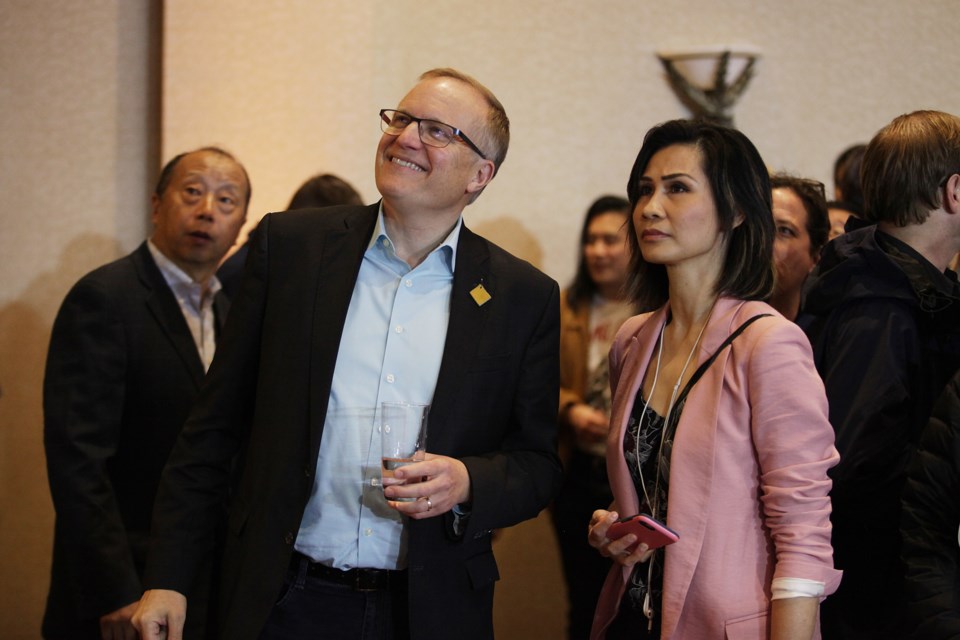It’s six in a row for Peter Julian.
Having won five consecutive federal elections, the New Westminster-Burnaby NDP candidate made it six in a row on election day. And he did it in spades.
“They have given me the largest majority I’ve gotten since I started running,” said Julian, who has served as New Westminster’s MP since 2004. “I work hard every day on their behalf because they are my bosses, and I never forget that.”
Preliminary results show Julian topped the polls in New Westminster-Burnaby with 23,022 (44.2 per cent) of the votes. That’s up from the 43.5 per cent of the vote he had in the 2015 election.
Trailing behind in this year’s election were: Liberal candidate Will Davis – 12,240 votes (23.5 per cent); Conservative candidate Megan Veck – 11, 278 votes (21.6 per cent); Green candidate Suzanne de Montigny – 4,280 votes (8.2 per cent); People’s Party candidate Hansen Ginn – 845 votes (1.6 per cent); Libertarian candidate Neeraj Murarka – 304 votes (0.6 per cent); independent candidate Ahmad Passyar – 82 votes (0.2 per cent); and Marxist-Leninist candidate Joseph Theriault – 57 votes (0.1 per cent).
“I find it is easier over the years because I meet so many people that we have helped,” he told the Record at the NDP election night party at the Hilton Vancouver Metrotown. “We have helped 15,000 families, so I do find it easier - when you have knocked on a door and helped a family, you’ve got their votes for life. What I find interesting is this is the largest majority we have had. In fact it is the largest majority the NDP has ever had in New Westminster. The results are still coming in, so I won’t take that to the bank.”
Julian said he’s knocked on several thousand doors while campaigning, but close to 10,000 since the 2015 election.
“It comes from hard work and helping people,” he said of his results. “I don’t take that for granted. I never will. I think whenever you start taking people for granted you are no longer of use to them in a democratic system. So I work as hard as I can.”
During the campaign, Julian said there were several issues that were raised over and over again. These included affordable housing, the climate emergency, and affordability issues related to medication, dental, interest on student loans and cellphone and data plans.
“Those are things we are going to start working on tomorrow,” he told the Record Monday night. “We have worked on them, but with a majority government there wasn’t the same interest.”
The Liberals had enough seats (157) to form a minority government, followed by the Conservatives (121), the Bloc Quebecois (32), the NDP (24), Greens (three) and one independent.
“Nationally, what this does is it shows that Canadians want a Parliament that gets things done,” Julian said. “They have said no to the majority government because I think it’s pretty clear that majority governments don’t have the same ability – they provide supports for the wealthiest and most privileged.”
Davis was pleased with the Liberal party’s results at the national level, but disappointed he didn’t fare better in the polls.
“I was genuinely surprised it was such a gap,” he said. “I was expecting more. I am definitely surprised.”
Davis said the Liberals raised more than $50,000 locally for the campaign, which is an accomplishment in itself. He believes there’s a groundswell of support for the party locally, and momentum is building to become more organized at the local level.
“I think the voters tell it like it is,” he said. “I think Canadians wanted change – they wanted to see something. I think there were some specific things people were concerned about.”
Davis said the election of a minority government gives the Liberals “another crack” at tackling issues that matter to Canadians. He’s confident Liberal Leader Justin Trudeau will use the opportunity wisely.



